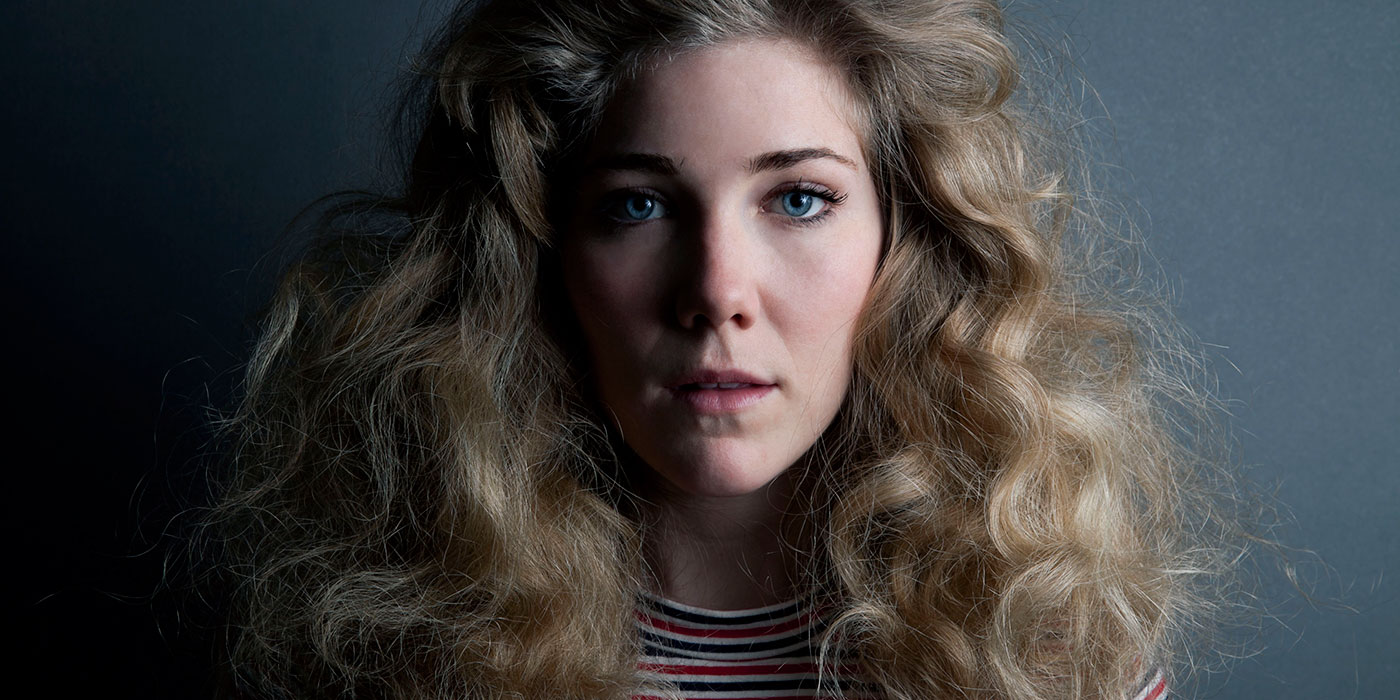If you make the wise decision of going to Caroline Smith’s concert at the High Noon Saloon this Wednesday night, know that you’ll be witnessing an R&B crooning soul-butterfly recently emerged from a folk-filled cocoon. Caroline Smith has put her band, The Good Night Sleeps, to rest in favor of a new sound that retains her lyrical charm at its core but replaces the folksy politeness with a raw, bold edge. Ladies, going to see her live may leave you feeling not unlike you just stepped out of sensible flats and into a pair of sexy heels. And guys, think twice before assuming that Smith may be for ladies’ eyes and ears only — with her indie bombshell look, sultry vocals, and excellent guitar work (à la Jenny Lewis, Thao, and Feist), Smith is for the people.
On tour now to promote the release of her Kickstarter-supported album, Half About Being a Woman, Smith kindly agreed to answer some of our questions about her musical metamorphosis. [spacer height=”10px”]
When did you start making music? Who were some of your biggest influences, interpersonally and creatively, as you began making music?
“I started making my own music when my father bought me a guitar. I was early teens, like 12-13, and my dad taught me all of his old folk songs he used to play us while we were growing up. So I guess I can safely say my dad was my biggest influence interpersonally. Creatively, I listened to a lot of ’90s R&B and neo-soul as a lot of us Gen Y kids did growing up. But it’s definitely what sparked my initial quest to craft the perfect pop song.”
When did you start creating music with a band, and how would you say that influenced the way you create and perform music?
“I still write all of my own music on my own apart from the band, but arranging and producing songs with a band has been so inspiring and instrumental in where I’ve ended up as a musician. My bandmates — Jesse Schuster, Arlen Peiffer, and Charlie Smith — have had a huge role in my growth as a musician.”
You’ve described your voice as being something of a “conglomerate” that reflects the influence of myriad vocalists. How much of your singing style started out with a particular vocalist (or vocalists) in mind, and would you say that you still have that same vocalist in mind as you create now? Or has that also changed as your style has evolved?
“That has definitely changed with the evolution of my music. I used to ‘effect’ my voice, treating it as an instrument kind of like how you can affect the sound of a guitar. But with this new record, it was such a raw look at me and the music I really wanted to write and how I really wanted to be singing, that I just stripped everything away and sang with my most natural voice. People who grew up singing with me from a young age used to ask me why I held back when I was singing folk music because they grew up with me learning Mariah Carey runs.”
On your website you describe your new album as one that is about self-acceptance and going back to the roots of “feel-good” music. What was the motivation behind your “return” to creating music with a positive message and upbeat songs? What sorts of steps did you have to take to get there?
“I think I just took the step into personal womanhood where the focus shifted from angst and tumult to self-appreciation and light-heartedness. I wasn’t having any fun writing all of those serious songs — that’s just not who I am at all and it’s definitely not the type of music I listen to. I just got stuck in this type of pigeon-hole with a bunch of work I wrote when I was 18. I wanted to come out of my 25-year-old shell at last!”
Many tracks off your recent album are charged with declarations of femininity. How much of the album was made with the intent of figuring out what being a woman meant to you, and how much was it about sending a positive message out there for other women?
“Well, the two kind of coincidentally collided while writing the record. The new songs are definitely finding my confident voice and becoming a woman, but I also found myself writing songs about the advice I give my girlfriends. It turns out I had a lot more girlfriends listening to the record than I thought. And every time someone tells me how a new song of mine helped them find their womanpower or helped them break up with a shmuck, I feel absolutely bowled over with pride. It’s a really good feeling to help my fellow lady.”
You recently started going on tour with backup singers. What was the motivation behind that? How do you feel like that changed the dynamic of your shows?
“The show is way more interactive and fun now, which is why I brought them on board. I didn’t want the live experience to be any less than the album experience. It should be more! Also, it’s just really awesome to have my girlfriends on tour with me.”
Do you feel like you’ve hit a particular stride with your music and performance style that you’d like to keep with, or could you see yourself going in a different direction?
“I really can’t see myself going in a different direction. This is what feels truest to me, what has always felt truest to me, and changing directions again would be me departing from myself again. It took me a long time to get back here and I can’t see losing myself again.”



